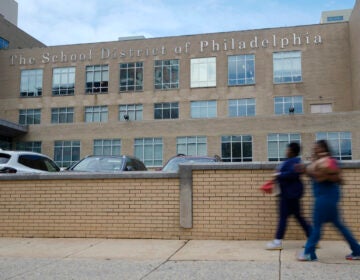Phila. school leader’s actions on charter deal raise ethical concerns
Just over a month ago, the chairman of the Philadelphia School Reform Commission took part in a pivotal, closed-door meeting to discuss the fate of a charter-school deal potentially worth $60 million, only hours after he publicly recused himself from voting on the matter due to a conflict of interest.
SRC Chairman Robert Archie confirmed his participation in the private session in an e-mail statement to NewsWorks and the Public School Notebook.
The meeting was held March 16 at Philadelphia School District headquarters, and included Archie, State Rep. Dwight Evans, and John Q. Porter of Mosaica Education, an Atlanta-based, for-profit school operator.
Earlier that day, Archie’s fellow commissioners had voted 3-0 to award Mosaica the right to negotiate for the charter to run Martin Luther King High in Germantown. Archie didn’t vote, citing his law firm’s ties to another applicant for the charter. Porter described himself that afternoon as “ecstatic” about the vote.
But the day after the three men met, Mosaica walked away from the King deal.
Porter explained the reversal at the time by saying that he did not want to interfere with Evans’ plans for his community. He also said that his company “did not believe that, without full support, we could be successful.”
A connected nonprofit benefits
Mosaica’s abrupt about-face left Foundations Inc., a New Jersey-based nonprofit with ties to both Archie and Evans, as the only bidder for the King charter. The law firm where Archie is a partner, Duane Morris LLP, has represented Foundations.
King is being transformed as part of Superintendent Arlene Ackerman’s signature Renaissance Schools initiative.
Ackerman has acknowledged that Porter came to her “deeply troubled” about the turn of events.
Zack Stalberg, chair of the Committee of Seventy, a civic watchdog group, called Archie’s action “highly improper.”
The chair of a volunteer panel advising the school district on the King turnaround said that group wants a full investigation into Archie’s behavior.
Archie has publicly acknowledged that Duane Morris has done work for Foundations. (For similar reasons, Archie has also recused himself from decisions involving Universal Companies, a charter provider slated to run Audenried High and Vare Middle School.)
Evans also has deep connections to Foundations, which has for decades been his preferred partner for education projects of all kinds in and around his West Oak Lane district. For the past eight years, Foundations has been managing King under contract with the district.
Archie and Evans have a longstanding personal relationship. Evans has referred to Archie in press reports as a friend “for more than two decades,” and Archie has been a frequent donor to Evans’ political campaigns, as have many Foundations executives.
King’s charter, initially for five years, is estimated to be worth approximately $12 million dollars a year to its manager. The charter could potentially be extended indefinitely.
King High’s fate now unclear
The future of King, a neighborhood high school that sits just outside the borders of Evans’ 203rd House District, is now back in the hands of the SRC. At a vote scheduled for April 27, the board will choose between granting the King charter to Foundations or leaving the school and its 1,000 students under district management.
Archie’s statement indicates that he was present at the meeting with Evans and Porter in his official capacity as SRC chair, in order to “facilitate collaboration among Mosaica, Representative Evans, and the district.”
The e-mail statement was his first public comment on the situation at King since Mosaica’s sudden withdrawal, despite multiple requests.
Archie also said that “no other members of the SRC had additional contact with Mosaica prior to their withdrawal.”
Archie was appointed to the SRC in 2009 by Mayor Michael Nutter and was named chair of the body by then-Gov. Ed Rendell. Neither Archie nor the other commissioners responded to a request for additional comment.
Calls for investigation
Stalberg, head of the Committee of Seventy, based in Center City, said Archie’s conduct merits an immediate explanation.
“The first responsibility is for Archie to make himself fully available to answer questions about what recusal means to him, what he said and did in the meeting, and what he thought the representative of Mosaica believed about his participation,” Stalberg said.
Stalberg says he believes Archie’s presence at the meeting will likely trigger the interest of state and federal investigators.
“The first questions will be the tough questions: Was anything illegal done here?” Stalberg said. “There’s no conceivable argument that I can think of that justifies his presence. There are other people on the SRC, if an SRC voice was needed in that conversation. By involving himself, he has clearly undermined the process, and he clearly undermined the superintendent.”
At King, the head of a volunteer panel charged by the district with monitoring the school’s Renaissance transition said the group is “deeply troubled” and wants a full probe.
During the months-long Renaissance process, the panel, called a School Advisory Council or SAC, was asked to evaluate the Mosaica and Foundations proposals, gather feedback from parents and students, and choose a preferred provider.
In a district-sanctioned vote in late March, the panel supported Mosaica over Foundations by 8-1. That choice was endorsed by Ackerman, and made official by the SRC’s March 16 decision. Then came the closed-door session.
Conchevia Washington, chair of the King SAC, said in a statement, “We don’t believe that [Archie] was representing his position as SRC chair by being in that room.”
Evans pushed his case
While the cast of the pivotal March 16 meeting is now known, the full details of what was said remain unclear. Evans has said he made a strong argument in favor of his own plans, telling Porter that his network of educational institutions, in which Foundations plays a key role, shouldn’t be disturbed. Evans said he did not exert any undue pressure on Porter.
Evans’ role influencing Mosaica’s decision has been known since first being reported by NewsWorks and the Notebook on March 17, when he suggested that his intervention had been decisive.
“I had a very sound strategy and plan,” he said at the time. “And I believe I made a very convincing argument.”
Mosaica’s Porter has confirmed he was in the room with both Evans and Archie, but declined to discuss details, other than to say that Ackerman was not involved.
“I don’t want to stand in the way of Rep. Evans and what he’s trying to do in that community,” said Porter recently. “I want to focus on Birney [Elementary],” a North Philadelphia school whose charter Mosaica also won during the Renaissance process. Porter has told the King SAC that Mosaica would be willing to return to King as long as it had the full support of the community.
Ackerman has called Mosaica’s withdrawal “tragic,” but has said that she would not oppose Foundations if the SRC chooses to award it King’s charter. She has also said that she “knew there was a problem” involving Mosaica after the SRC approved its bid, but that she didn’t know the details.
Ackerman elaborated on that position in a statement Tuesday. In an e-mail, district spokeswoman Jamilah Fraser wrote that on March 16, “a confused and deeply troubled John Porter reached out to Dr. Ackerman to express his hesitation in an off-the -record conversation. During that conversation Dr. Ackerman told Mr. Porter that the District, the SAC and the SRC were in full support of the match [between Mosaica and King].” Fraser said Porter did not provide Ackerman with explicit details about the problem.
Deeper questions about who runs schools
Stalberg believes Archie’s presence in the March 16 meeting will trigger not only questions about the King charter, but about the politically appointed board that oversees the $3.2 billion district and its nearly 200,000 public and charter school students.
“I think there’s a good chance that this will fire up the question of who is the SRC, and why is the state running our schools anyway?” Stalberg said. “The incident and the larger question may be totally different things.”
Stalberg, who edited the Philadelphia Daily News for three decades, said the story of Archie and Evans’ closed-door meeting is unlike anything he’s heard in recent years.
“Philadelphians believe that this kind of activity goes on frequently,” Stalberg said. “But to tell you the truth, I can’t think of a situation in which it’s actually been documented. So in terms of proving what we all believe, it’s been a long time.”
This story is the product of a news-gathering partnership between NewsWorks and Philadelphia Public School Notebook.
Note: An earlier version of the story incorrectly paraphrased Zack Stalberg’s statement that investigators might ask about Robert Archie’s actions: “Was anything illegal done here?” Stalberg did not say that Archie did something “potentially illegal.” NewsWorks and the Notebook regret the error.
WHYY is your source for fact-based, in-depth journalism and information. As a nonprofit organization, we rely on financial support from readers like you. Please give today.




